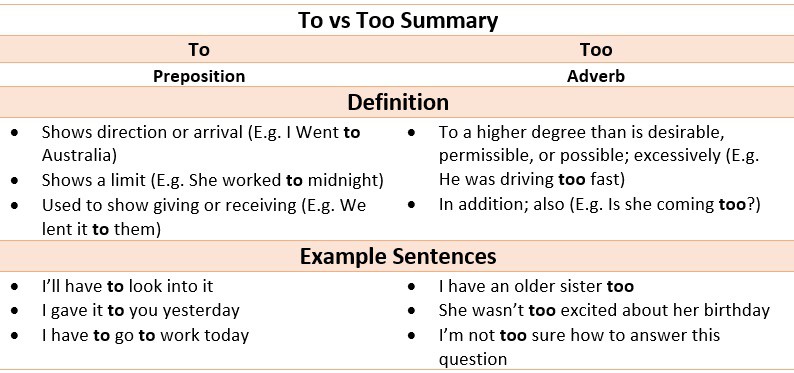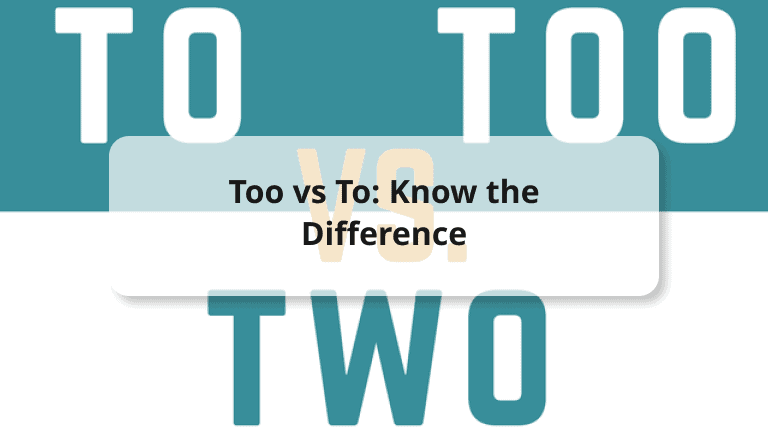What’s the difference between to and too?
To put it simply, To is a preposition used in cases like towards or to describe limit; Too is an adverb, meaning “also” or “excessively”. These two words confuse many people when writing, and speaking English. This is true for both native speakers and people who are wondering how to learn English. The reason these words are so confusing is that they are homophones. Homophones are words that sound exactly the same, but are spelled differently, and mean entirely different things.
In this article we will give you a detailed definition of each of these words, along with some examples, to make learning and using these words fun, and easy for you. To get the most out of this article try coupling it with these amazing beginner English lessons.

Table of Contents
Meaning of Too and To
Source: IELTS
Too – is an adverb that can be used to replace words like, “additionally”, “excessively”, “as well” and “also”
To – is a very versatile preposition, that is used to indicate a direction, like “toward” and “until”

What’s the Difference Between To and Too?
Too:
Is an adverb: a word that describes, or gives more information about a verb, adjective, or phrase.
To:
Is a preposition: a word usually preceding a noun or pronoun, and describes relations to another word or element.
Use To or Too? Too and To Examples:
Let’s take a look at some example sentences, found in newspaper headlines, to distinguish between too and to:
As a 76-year-old let me say: Joe Biden is too old to run again. – The Guardian
When too much news is bad news: is the way we consume news detrimental to our health? – The Conversation
Electric cars too expensive for many, even with aid in climate bill – New York Times
To Escape the War, Ukraine’s Factories Are Moving West – New York Times
Kenyans go to polls against backdrop of soaring cost of living – The Guardian
Is there really a paradigm shift in US/Africa relations? Why the answer seems to be yes – The Conversation
While learning how to speak English, you probably came across many more words with multiple meanings. Yup, that’s right, these above-mentioned words aren’t the only ones. So it’s easy to get confused, but with enough practice, you will get the hang of it.
How to Tell the Difference Between To and Too?
When speaking English, you won’t really need to remember which is which, since they both sound the same. But things get more problematic when writing if you don’t know the difference between to and too exactly. Have you ever seen a text saying “I love her to” or “can I have one to”. Mixing these two up is very easy, even native speakers and seasoned writers have trouble. But below we have some tips to help you distinguish between these two words, and make it easier to know when to use which.
To is a lot more versatile and widely used than too. So by understanding the meaning of too well, you can easily figure out which word to use, by using the process of elimination. (If it’s not too, then it must be to.)
If you want to say ”also”, “in addition” or “as well”. Then too is the answer.
The word too has an excessive amount of “o’s”. Thus, if you want to refer to “too much”, “extremely” or “an excess of,” remember to add a second “o.”
What about Two?

Source: YourDictionary
Two doesn’t confuse people as much as to and too does. But since they’re all pronounced the same, let’s take a quick look at the word two.
Two can act as both, an adjective or a noun. In both cases, it refers to a total of one greater than one, i.e. the number two (or 2)
- Two as an adjective:
The clerk packaged two bottles of wine for the customer
- Two as a noun:
It’s two in the morning! Why are you awake?
English can seem like a very difficult and daunting language, and these homophones don’t make it any easier. But all of this isn’t impossible to learn and master. So if you’re considering learning English, but haven’t started yet, check out our article on how to learn English quickly.

This Wasn’t Too Much To Handle, Was It?
Homophones, like two, too and to are an interesting, yet confusing bunch, because they sound the same, but have different spellings and meanings. But despite the confusion they cause, it’s not impossible to learn the difference and master these words. With daily practice and the help of amazing English tutors, your problems would be solved in no time! So, is it to late or too late? We are sure that now you are confident to say the answer out loud!
If you enjoyed this article, and want to explore other topics, go check out AmazingTalker now.

















